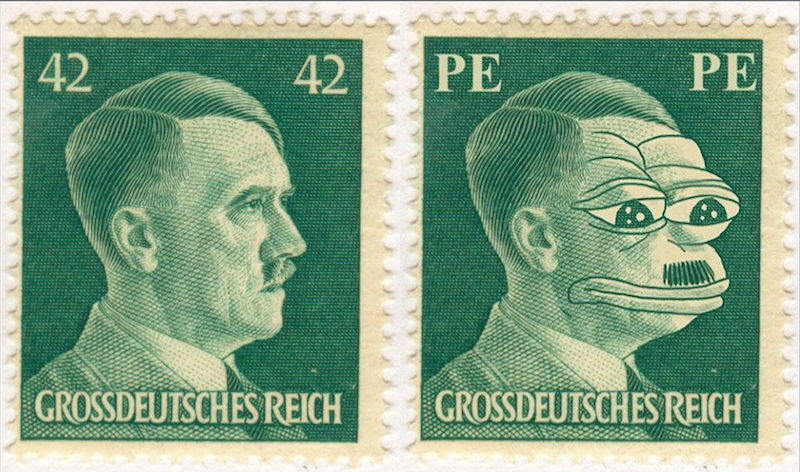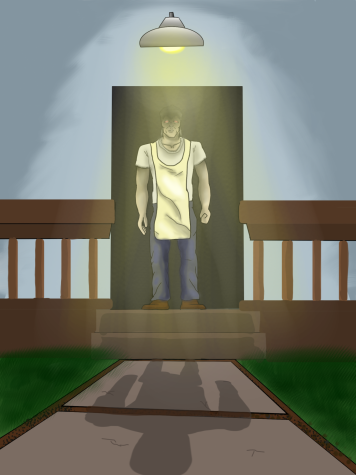A Few Good Memes
Memes playing off of themes of Nazism and fascism have become common in many parts of the internet.
Whether you’re a casual internet user or a frequent keyboard surfer, chances are you’ve seen a meme at some point in your life.
Memes, defined as “ideas, behaviors or styles that spread from one person to another in a culture,” have become commonplace in American internet culture, especially among youth. Characteristic themes and formats are used to invoke pop culture at large, and create a common heritage on sites like Reddit, 4chan, Instagram, and iFunny.
There was, for a time at least, no meme more popular than Pepe the Frog. Tracing his beginnings to the 2005 webcomic series “Boy’s Club” by Matt Furie, Pepe has become something more than the oddball stoner he was once portrayed as by Furie.
As the internet has evolved, so has Pepe, spawning various iterations, each used to express a different mood or purpose, ranging from smug accomplishment to anger to resigned defeat. Pepe even became a “cultural currency” on sites like 4chan and Reddit, according to Don Caldwell, senior editor at the website KnowYourMeme, in an interview with NPR.
“This was all, like, really just silly, like, you know, joking images,” Caldwell told NPR.
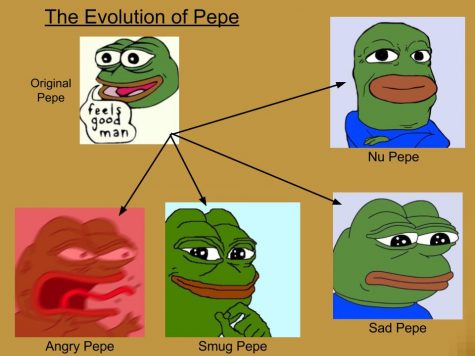 However, as with every popular trend, what can be used for good can be used for ill, with Pepes in klan robes, Nazi armbands, or worse, popping up all over sites like Reddit and 4chan. After years as an acceptable meme, the rising popularity of these types of images resulted in the Anti-Defamation League (ADL) declaring Pepe the Frog an official racist hate symbol just this year.
However, as with every popular trend, what can be used for good can be used for ill, with Pepes in klan robes, Nazi armbands, or worse, popping up all over sites like Reddit and 4chan. After years as an acceptable meme, the rising popularity of these types of images resulted in the Anti-Defamation League (ADL) declaring Pepe the Frog an official racist hate symbol just this year.
The ADL stated that the racist and anti-semitic co-optation of Pepe by the so-called “alt-right” has resulted in the meme becoming a “symbol for hate,” per the ADL’s website. Hillary Clinton, along with news organizations like the LA Times, NPR, and the Daily Beast, have issued similar sentiments, with response pieces posted by the Daily Caller and Time, among others.
This trend mirrors the conflict that has risen in notoriety, especially during this election season. There has been considerable clash between liberals and conservatives over limits on speech, with political correctness even making its way into the president-elect’s classic talking points.
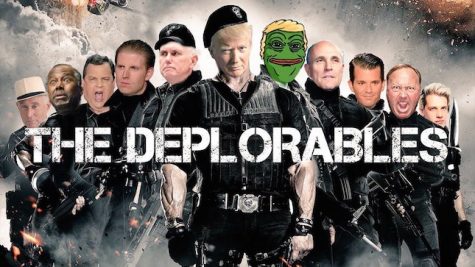
The president-elect’s son, Donald Trump Jr., even posted an Expendables-themed poster titled “The Deplorables” (a reference to Hillary Clinton’s widely-panned “basket of deplorables” remark) stating pride for having “made the cut.” And who is that, standing to Trump’s left, you might ask? Why, Pepe the Frog, of course, complete with a blonde combover!
Pepe has undoubtedly made an impact, or at least a few appearances, through the course of this election cycle. However, it shouldn’t be shocking that the internet plays a greater role in our society than ever before. Considering the vast network of ways that the internet connects people and spreads ideas, it’s almost laughable to think it wouldn’t have an impact.
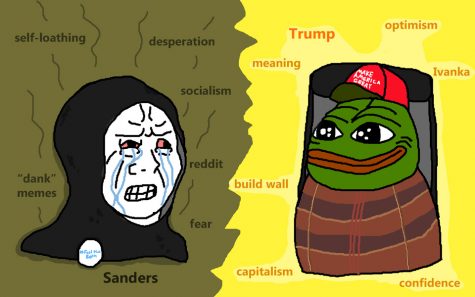
Conservative internet users often use Pepe (among other memes) to express political messages and ridicule others.
In an age where, according to the Pew Research Center, 38% of adults (and 50% of those between ages 18-49) get the majority of their news on the web, online information can clearly affect beliefs beyond people’s politics. If you desire to change our society-at-large, there’s seemingly no better place to start.
However, in combatting hate, explicitly seeking to place limits can often be out of the frying pan and into the fire. These trolls thrive off the forbidden fruit aspect of posting offensive content; the more taboo it becomes, the greater the thrill for many on the internet.
Beyond this, maintaining the freedom to exchange ideas through the internet is essential in undercutting the message of the very far right political groups these measures take aim at. When dealing with a violent outcry against censorship, it’s almost common sense that an additional limit would be counterproductive.
At the same time, we can’t avoid the negative history of harmful symbols like the swastika or the white pointed hood of the KKK. Recognizing a hate symbol is a necessary first step to becoming aware of how they are used to advance the message of racism and other bigotry.
Even within the walls of the school, students hold widely differing viewpoints of Pepe’s new status as a hate symbol.
“We shouldn’t let people promote hatred, because then other people will join them and continue their hate,” said sophomore Mo Ahmed. “I think it’s justified.”
Freshman Tina Wilkens says otherwise. “Of course he shouldn’t be considered a hate symbol. A hate symbol is something that is only used for hate. Memes are like a kitchen knife. Sure you can stab someone with it, but you could also just cut up your dinner.”
Junior Trinity Ek feels differently, despite being a past fan of Pepe. “It used to be just a harmless, good-natured image,” she said. “But the alt-right co-opted it to inflict harm on others.”
Still others, like senior Joe Crepeau, wholeheartedly believe the ADL’s decision to be a mistake: “Pepe is not a hate symbol. It was just people using a frog character with offensive language to get a reaction–they overreacted. It wasn’t right.”
We can all agree that at some point, speech ceases to be an impartial way to convey ideas, and becomes an active provoker and inspirer for hate. The point at which it does so, and what society should do in response, is where the controversy begins.
In the coming years, we must find an effective way to toe the line between censorship and limitations on hate. As the internet generation comes of age, this answer can’t come soon enough.



